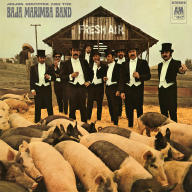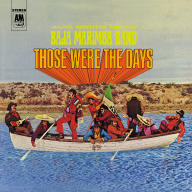Julius Wechter
from Chicago, IL
May 10, 1935 - February 1, 1999 (age 63)
Biography
With his Baja Marimba Band, Julius Wechter popularized, updated and Americanized the traditional marimba sound in the same way his friend and frequent collaborator Herb Alpert the Tijuana Brass revitalized the Mexican mariachi band--as a member of Martin Denny's backing group, he was also a catalyst behind the exotica phenomenon. Born in Los Angeles on May 10, 1935, as a teen Wechter enjoyed a series of small roles in Hollywood films before adopting the vibraphone at the same time as the West Coast jazz scene began to flourish. In 1956 he recorded a solo LP, Linear Sketches, but the record went nowhere and a year later, he was tapped to replace vibist Arthur Lyman in Denny's combo. With his simple piano melodies, bird whistles, jungle sound effects and Latin-inspired rhythms, the Hawaiian-based Denny created a lushly romanticized aural portrait of island life he called "exotica," and in 1959 the group scored an international smash with the instrumental Quiet Village. Wechter remained with Denny's ensemble until 1962, when he returned to L.A. and worked as a session musician on studio dates for the Beach Boys and producer Phil Spector. He first worked with Herb Alpert when he played marimba on the latter's breakthrough hit The Lonely Bull, later composing Alpert's oft-covered hit The Spanish Flea and adding percussion to all the Tijuana Brass recordings. After Alpert launched his own label, the venerable AM, he encouraged Wechter to form his own group, and the Baja Marimba Band was born. Described by its leader as "like the Tijuana Brass' bad little brothers -- we'd flop on-stage in big sombreros and old clothes with big pasted-on moustaches, smoking cigars and drinking beer," the group's tongue-in-cheek, good-time music often belied the virtuoso skills of its members, who also included Dave Wells, Lee Katzman, Bernie Fleischer, Bud Coleman and Curry Tjader, brother of Latin jazz icon Cal Tjader. The Baja Marimba Band quickly hit the charts with its first single, 1964's Comin' in the Back Door, and in all recorded close to a dozen LPs for AM, regularly touring as Alpert's support act and becoming a staple of the Las Vegas nightclub circuit. By the mid-'70s the group splintered and Wechter returned to Hollywood, this time to pursue session work, later scoring the 1980 Disney film #Midnight Madness. In 1986, he and wife Cissy penned the musical revue #Growing Pains, and in 1990, he briefly led a new Baja Marimba Band lineup, issuing the album New Deal. From there, Wechter turned his attentions away from performing toward psychology, earning his Master's degree from Antioch College and working as a counselor for the Burbank Family Service Agency; he also served as vice president of the Southern California chapter of the Tourette's Syndrome Association, fighting a condition with which he was himself afflicted. Wechter died of lung cancer on February 1, 1999. ~ Jason Ankeny, Rovi
Top Tracks
Albums
Videos
Close













